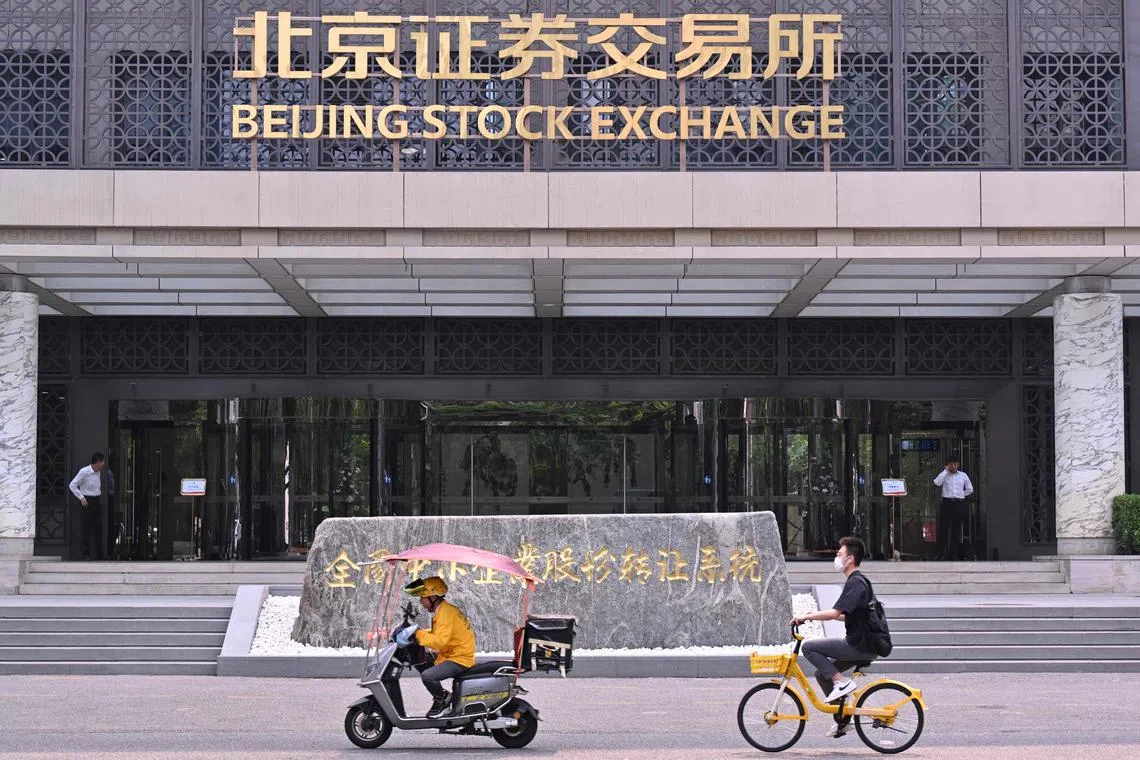China cracks down on short sales, quants to boost stocks
Sign up now: Get ST's newsletters delivered to your inbox

The moves by the Chinese financial authorities are to support the nation’s sliding stock market as a closely watched economic policy meeting approaches.
PHOTO: AFP
BEIJING – China has taken some of its most extreme steps yet to restrict short-selling and quantitative trading strategies, seeking to support the nation’s sliding stock market as a closely watched economic policy meeting approaches.
The China Securities Regulatory Commission approved an increase in margin requirements for short-selling starting July 22, making the trades more expensive for hedge funds and other investors. Meanwhile, China Securities Finance Corp (CSFC), the country’s biggest stocks lending provider, will suspend its business of lending securities to brokerages starting July 11.
The measures, announced on July 10 after the benchmark CSI 300 Index dropped for the sixth time in seven sessions, send a clear signal that the authorities want to stem a slump that has erased about US$1 trillion (S$1.35 trillion) of onshore market value since mid-May. While this is providing a knee-jerk boost to sentiment, the limited role of short-sellers in China suggests any long-term impact may be limited.
The CSI 300 Index gained more than 1 per cent on July 11, on track to snap a run of weekly losses. The Hang Seng China Enterprises Index, which tracks big Chinese firms, rose as much as 1.6 per cent in Hong Kong.
The Chinese authorities, along with their counterparts in South Korea and Thailand, have been among the most aggressive in Asia in restricting short sales and quantitative trading strategies in an attempt to bolster share prices. Yet the moves have done little to address the root causes of weak markets, which in China include persistent concerns about its housing crisis, renewed trade tensions and low consumer confidence.
“The move sent another signal that the regulators are concerned about the risks to the securities industry, given the build-up of short positions that may be concentrated,” said Mr Redmond Wong, market strategist at Saxo Capital Markets. “It may prop up the prices of some stocks that have large short interests... For the broader market, the impact is likely to be limited.”
After rallying sharply from February, Chinese stocks have slid since May as unease grew over poor corporate profits. The CSI 300 has given up almost all its gains in 2024, while the MSCI China Index earlier fell into a technical correction. There are signs that the nation’s sovereign wealth fund is once again propping up markets through purchases of exchange-traded funds.
President Xi Jinping will convene the government’s Third Plenum, a once-in-five-years gathering, on July 15. Expectations for a massive stimulus are subdued, with analysts from Goldman Sachs to JPMorgan Chase & Co saying that Beijing will likely just scale up existing measures.
Under the new rules, investors need to put down a margin deposit equivalent to 100 per cent of the value of the securities they seek to borrow for short-selling. Until the change, the ratio has been at least 80 per cent. The margin ratio for private funds participating in stock lending is also raised to 120 per cent from at least 100 per cent.
“In the short term, this will trigger the closing of existing short positions and limit the new opening of short-selling activities,” said Mr Steven Leung, executive director at UOB Kay Hian Hong Kong. In the medium term, “the A-share market still performs on economic fundamentals and corporate earnings”, he said. BLOOMBERG


